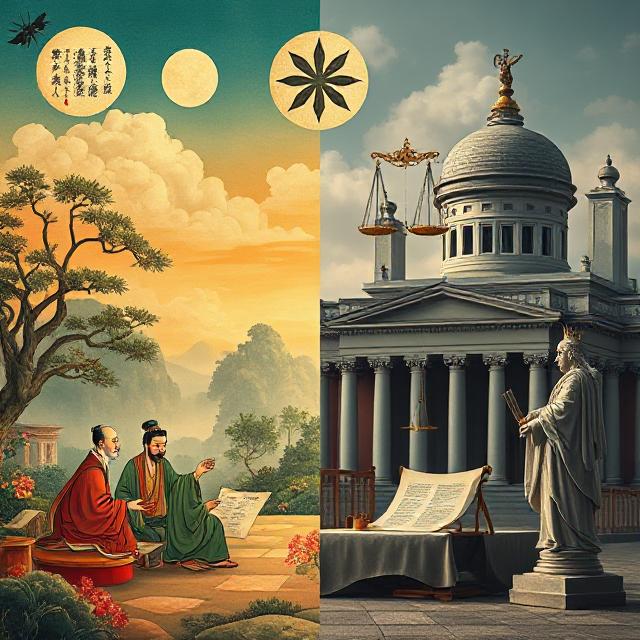
Table of Contents
Moral Authority in Confucianism vs Social Contract Theory
Moral authority in Confucianism vs social contract theory is not just a question of East versus West, but a profound inquiry into the roots of legitimacy, obligation, and the very idea of justice. Does morality flow from tradition and hierarchy, as Confucius taught, or from individual consent and mutual agreement, as modern Western thinkers argue? These two worldviews offer contrasting blueprints for political ethics and personal responsibility.
This post explores both models, their historical roots, philosophical foundations, and practical implications. It asks what binds people to each other—filial piety or rational agreement? Cosmic order or contractual consensus?
I. Confucianism: Moral Authority Through Tradition and Virtue
A. Confucian Ethics: Harmony and Hierarchy
Confucianism, rooted in the teachings of Kongzi (Confucius), is a deeply relational philosophy. It sees the universe as an ordered whole, where individuals find meaning through roles and relationships.
- Central to Confucian ethics is ren (仁): humaneness, compassion, and benevolence.
- Moral authority stems from li (禮): rituals, customs, and social norms.
- The family is the root of virtue; society is an extension of filial love.
The superior person (junzi) leads not by force, but by moral example, cultivating inner virtue to guide others.
“The moral power of the gentleman is like the wind; the moral power of the petty person is like the grass. When the wind blows, the grass bends.” —Confucius
B. Hierarchical Order as Ethical Structure
Confucianism promotes a structured society with clearly defined relationships:
- Ruler to subject
- Parent to child
- Elder to younger
- Husband to wife
- Friend to friend
Each role carries duties. Moral authority arises not from consent, but from fulfilling one’s role with integrity. This is a virtue-based system rooted in moral cultivation, not external laws.
C. The Mandate of Heaven (Tianming)
Confucian political thought integrates a cosmic moral order:
- Rulers are legitimate only if they govern virtuously.
- Heaven (Tian) withdraws its mandate from corrupt leaders.
- Citizens are not passive; they may resist immorality by refusing loyalty.
This concept blends spiritual cosmology with ethical governance, framing authority as earned by moral excellence.
II. Social Contract Theory: Moral Authority Through Consent
A. Origins in the Enlightenment
Social contract theory emerged in 17th–18th century Europe, as a response to absolute monarchy and divine right.
Key figures include:
- Thomas Hobbes: The state arises to avoid chaos; people cede rights for security.
- John Locke: Government exists to protect natural rights; its authority depends on consent.
- Jean-Jacques Rousseau: Legitimate authority comes from the general will; inequality corrupts moral society.
Unlike Confucianism, this theory assumes humans are autonomous, and that morality is constructed by mutual agreement.
B. Contract, Not Custom
The social contract rests on the idea that people are equal by nature, and bind themselves into a political body through:
- Voluntary agreement
- Rational deliberation
- Legal frameworks
Moral obligations are not inherited through roles, but chosen through reasoned consent. Authority is procedural, not traditional.
C. Revolution and Rights
Social contract theory legitimizes not only order, but resistance:
- If a government violates rights, it loses legitimacy.
- Citizens are entitled to withdraw consent or revolt.
- Authority is always conditional, based on performance.
This gave rise to constitutional democracy, civil rights, and legal protections against tyranny—a vision starkly different from Confucian submission to virtuous rule.
III. Comparative Analysis
| Dimension | Confucianism | Social Contract Theory |
|---|---|---|
| Basis of Morality | Virtue, tradition, role fulfillment | Rational consent, mutual agreement |
| Source of Authority | Moral example, cosmic order | Legal legitimacy, individual autonomy |
| Role of Individual | Defined by social relationships | Autonomous, rights-bearing agent |
| Response to Injustice | Withdrawal of loyalty | Revolution, rejection of contract |
| View of the State | Ethical family writ large | Protective mechanism formed by consent |
Confucianism embeds moral authority in continuity and cultivation; social contract theory locates it in choice and critique.
IV. Synthesis: Is There Common Ground?
While these systems seem opposed, both aim for a moral society based on legitimate authority. Hybrid possibilities include:
- Virtue constitutionalism: Institutions built on both ethical integrity and legal legitimacy.
- Communitarian liberalism: Individual rights supported by social responsibility and tradition.
- Contextual authority: Confucian insights on moral development alongside Western insistence on checks and balances.
In modern societies, Confucian ideals persist in East Asia, influencing leadership styles, education, and civic responsibility. Social contract theory underpins Western democracies and human rights frameworks.
Together, they ask us:
- Should morality be taught or chosen?
- Is authority earned through example or agreement?
- What sustains social trust—ritual or rationality?
Conclusion: Tradition or Consent?
Moral authority in Confucianism vs social contract theory is ultimately a dialogue between virtue and volition, heritage and choice. Confucianism grounds ethics in cultural continuity and moral refinement, while social contract theory empowers individuals through reasoned agreement and collective will.
In a world struggling to balance freedom and cohesion, both views offer timeless insights. Whether we look to ancestral wisdom or modern consent, the question remains: how shall we live, and by what right shall we govern each other?
